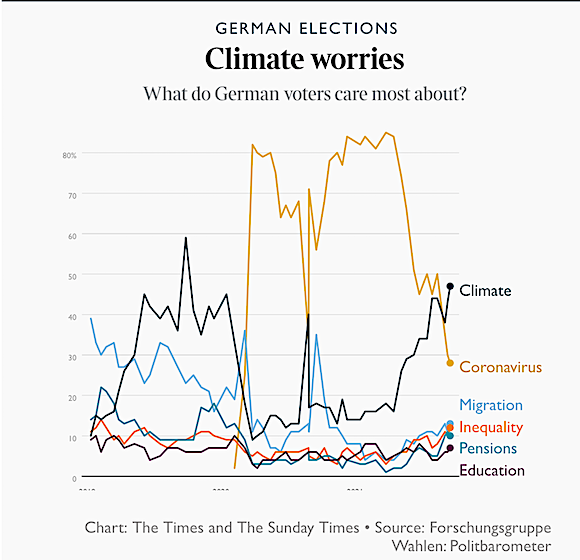Germany held its parliamentary election today, and the race between the retiring Angela Merkel’s Christian Democratic Union and the left’s Social Democrats is too close to call. The London Times reports:
The chancellor’s conservatives were predicted to lose to the centre-left Social Democrats (SPD) by roughly a percentage point, although the outcome remained too close to call.
***
The finely balanced results herald a phase of uncertainty that could drag on for months as the parties wrangle over the terms of the next government, leaving a vacuum of indecision at the heart of Europe. Scholz and Laschet drew up the battle lines last night for what are anticipated to be some of the toughest coalition talks in decades.Merkel will stay on as caretaker chancellor while Scholz and Laschet court the support of smaller parties in a race for a parliamentary majority.
Whatever. Merkel’s “conservatives” are not conservative in the American sense. No doubt they are better than the Left, but it is hard to get excited about the upcoming negotiations to form a governing coalition. The ultimate result will be little change, as coalition partners need to be appeased.
This is what is most interesting to me: poll data on what Germans have thought were the most important political issues over the last few years:

For the last year or two, the coronavirus–a flu bug about which government can do little or nothing–has been issue number one. As the virus fades, the biggest issue for German voters currently is the climate–something about which it is even more obvious that the government can do nothing. The other issues, although far down the line, include migration–I assume nearly all of those who cite migration as the number one issue are against it–“inequality,” which I take it is shorthand for leftism, pensions and education.
Notably missing from the list are the issues that have traditionally been front and center. Nothing relating to war and peace is on the list, which I guess is a good thing, given that we are talking about Germany. Nor is there anything about economic development. In today’s developed world, peace and prosperity–historically the two dominant political issues in the West–are more or less taken for granted. This frees voters to focus on matters where government is largely or entirely incompetent, like the spread of a virus or the vicissitudes of the weather.
Across the developed world, we see the devolution of politics from issues of war, peace and prosperity to virtue voting, and Germany’s current election offers a stark instance of the phenomenon.
Notice: All comments are subject to moderation. Our comments are intended to be a forum for civil discourse bearing on the subject under discussion. Commenters who stray beyond the bounds of civility or employ what we deem gratuitous vulgarity in a comment — including, but not limited to, “s***,” “f***,” “a*******,” or one of their many variants — will be banned without further notice in the sole discretion of the site moderator.